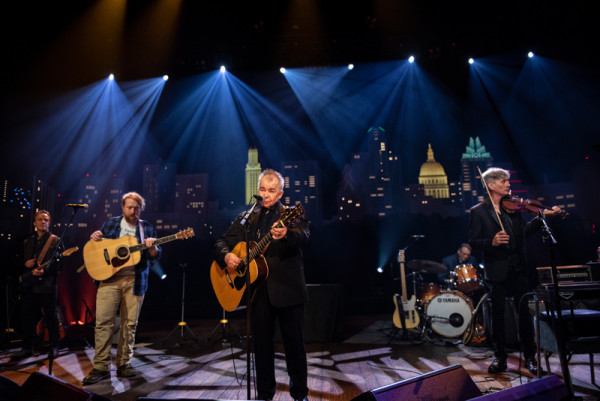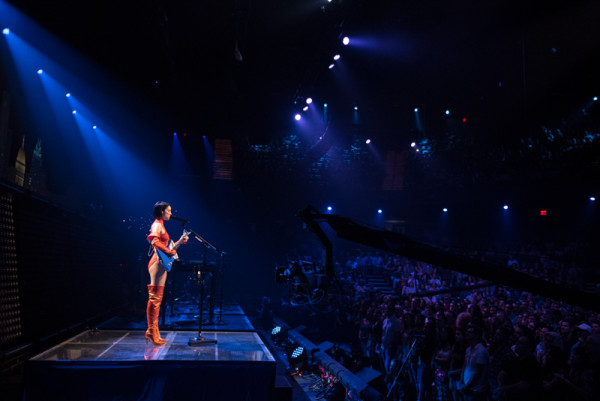If there’s proof you can be a superstar and a restless innovator, it resides in the art and life of Janelle Monáe. The Atlanta-based singer, songwriter, producer, actor and label owner was proclaimed a star right out of the box with her debut album The ArchAndroid, and her stock has done nothing but rise since. Following two renowned LPs and breakout roles in the Oscar-nominated Hidden Figures and Oscar-winning Moonlight, Monáe hit the music world like a freight train with the wildly lauded Dirty Computer, a major statement on community and inclusion and her most successful album yet. We were thrilled to host her acclaimed four-act masterpiece that is the Dirty Computer tour.
The band took the stage to the strains of “Also Sprach Zarathustra” before launching into the title track of Dirty Computer. The scene thus set, Monáe herself climbed the white pyramid at center stage for “Crazy, Classic, Life,” a song that lays out her philosophy and invites everyone to join in. Donning a guitar, she chunked out the chords to “Screwed,” a catchy funk/pop tune that conflates the act of sex with the exercise of power. Changing her costume onstage in front of a mirror held by a dancer (a nice homage to the futuristic funk of The Time), Monáe ascended the throne that appeared at the top of the pyramid for “Django Jane,” a fiercely rapped anthem of empowerment for weirdos everywhere. The lights went down for a minute as the four dancers changed costume; when illumination returned, it was to the tune of “Q.U.E.E.N.,” from her sophomore record The Electric Lady. That was followed by the title track from that LP, which became a call-and-response singalong with the electric ladies in the audience, who knew every word. After letting the crowd know that they were loved, Monáe eased into “Primetime,” a positive power ballad that guitarist Kellindo Parker morphed into the ending solo of key Monáe influence Prince’s “Purple Rain.”
After a break, bassist Téja Veal and keyboardist Krystal Johnson broke out the keytars and Monáe and her dancers came out for the catchy funk rock of “Pynk,” her infamous ode to human anatomy. While that song is as much about the color all people have in common inside as anything more lascivious, there was no mistaking the erotic vibe of “Yoga,” her 2015 single with rapper Jidenna. “We’re here to celebrate self love,” she declared, but before anyone could get the wrong idea, she followed that sentiment with “I Like That,” a song about self-acceptance that became another communion between performer and audience. The stage darkened once again, before everyone returned for a redo of “Pynk.” One more quick interlude later, and it was on to the awesomely hooky “Make Me Feel,” a sensual bit of stripped-down funk with nods to Michael Jackson (who inspired Monáe’s shadow dancing during the intro), Prince (who helped create sounds for the song before his untimely death) and James Brown (bits of whose “I Got the Feeling” made sporadic appearances). The funk kept roiling with “I Got the Juice,” yet another highlight from Dirty Computer that became a showcase not only for her dancers, but select members of the audience Monáe invited to show off their juice. The dancing kept going as the lights went down, the spotlight came up, and Monáe returned to redo her silhouette dance and the rest of “Make Me Feel.”
Monáe and band returned to remind the audience that her work celebrates inclusion, empowerment and the fight for the rights of those unfairly pushed to the margins. “I come in peace,” she explained, “but I mean business.” To underscore the point, she ended the main set with an extended “Tightrope,” the rocking soul tune that was a highlight of her debut. But that was not, of course, the end. Egged on by enthusiastic applause, Monáe and the band returned for the rollicking “Come Alive (War of the Roses),” which blazed across the stage, heavy on audience participation, before the star danced her way through the crowd itself. It was an incredible end to a show like no other that’s ever graced the Austin City Limits stage, and we can’t wait for you to see it when it airs this season on your local PBS station.


